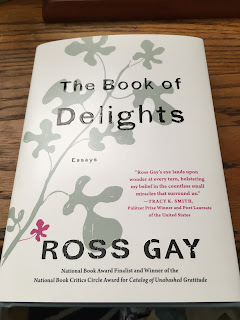What About Grace?
A
few snow falls ago, I curled up with Netflix and binge-watched the show “The
Good Place.” The premise of the show is this: there’s a woman named Eleanor who
dies and goes to the Good Place. The problem is there’s been some kind of mix-up
and she’s not supposed to be there. But, she doesn’t want to go to the Bad
Place, so she tries to learn to be good: to earn her place there. At some point
during her stay in the Good Place, she learns about this point system: each
time you do something good, you get points. And when you do something not good,
you lose points. Eleanor learns about the point ticker and, hoping that you can
still earn points for the Good Place after death, she spends a whole day just
doing good things: holding doors for people, saying nice things to people, etc.
Later in the day she looks down at the ticker and she’s shocked to see that the
number hasn’t changed. She’s still in the red. With the help of her companions,
she realizes the problem isn’t that the ticker is stuck. The problem is her
motivation. As long as her goal is for her own personal gain, none of the good
things she does matters.
As
a pastor (and a Christian), I have to watch “The Good Place” with blinders on
because honestly, it’s full of questionable theology. But it’s a funny show. I
do enjoy it. I also enjoy the questions it makes me think of, like the
questions surrounding the “good deed ticker.” The biggest question that comes
to my mind is “What about grace?”
As
Christians, we believe in grace. We don’t believe there’s someone out there
with at ticker-counter keeping track of all the good we do and subtracting
points for all the bad we do. We believe in the truth of Ephesians 2:5 that it
is by grace we have been saved: “this
is not of your own doing; it is the gift of God – not the result of your own
works, so that no one may boast.” This is the joy of Easter: the reminder that
Jesus came and died and rose for us so that we don’t have to try and earn a
place in heaven. Jesus saves us and I believe that even when we don’t believe
in Him, He keeps believing in us. That’s unconditional love. That’s grace.
It
doesn’t mean we can do whatever we want. The Apostle Paul addressed this in
Romans 6 when he said (from The Message),
“Do we keep on sinning so God can keep on forgiving? I should hope not!” And
James tells us that faith without works is dead (James 2:14-26). God gives us
grace so we don’t have to stress about whether or not we’re good enough for
God. We do good things and love one another because of that love God has for
us.
Our
motivation matters. Why you help someone matters because we don’t help people
because we think it gets us a better seat on the heaven train. We don’t love
one another because we think it makes us more attractive in God’s eyes. God
already loves us. Unconditionally. That’s the joy of Easter. Living as an
Easter people means we live every day remembering how much Jesus loves us: so
much that He would die and rise for us.
Grace
sets us free. Grace frees us up to live: to make mistakes here and there, but
always to learn along the way. Grace frees us to be children of God in the ways
that make sense to us, which means we can be creative. You can be creative
about how you live gracefully. I’m pretty grateful for grace. How about you? How will you live gracefully and show each other grace? And will you be honest about your motivations?
Blessings to you!

Comments
Post a Comment